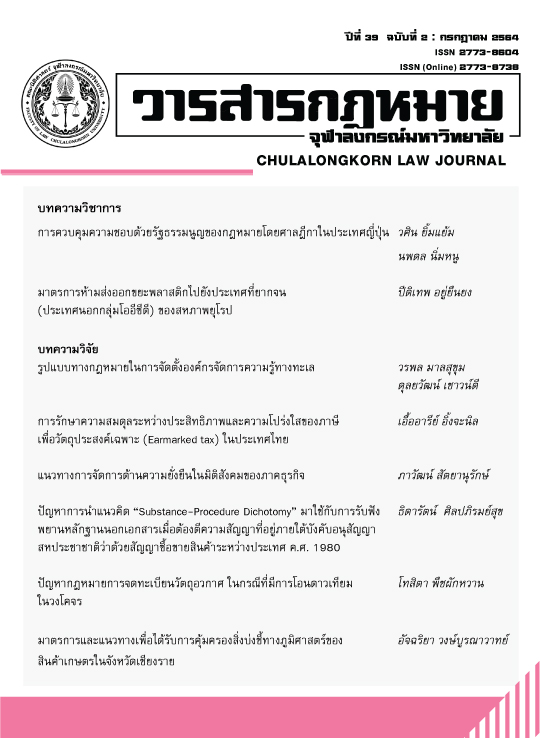มาตรการห้ามส่งออกขยะพลาสติกไปยังประเทศที่ยากจน (ประเทศนอกกลุ่มโออีซีดี) ของสหภาพยุโรป
Main Article Content
บทคัดย่อ
พลาสติกเป็นวัสดุที่ทนทานต่อการใช้งาน จึงถูกนำมาใช้ประโยชน์ได้หลากหลายและมีราคาประหยัด
โดยมากขยะพลาสติกมักถูกบำบัดด้วยวิธีการฝังกลบ การเผาในเตาเผา และการนำไปผ่านกระบวนการหมุนเวียน
กลับมาใช้ใหม่ อย่างไรก็ตาม ขยะพลาสติกหลายล้านตันมักถูกทิ้งลงสู่แม่น้ำและทะเล ประเทศที่พัฒนาแล้ว
ในภูมิภาคยุโรปมักส่งขยะพลาสติกทั้งที่สามารถนำกลับมาใช้ใหม่ได้และไม่สามารถนำกลับมาใช้ใหม่ได้ไปยัง
ต่างประเทศเพื่อลดผลกระทบด้านสิ่งแวดล้อมจากมลพิษขยะพลาสติกหรือไมโครพลาสติก ขยะพลาสติกปริมาณ
มหาศาลจากประเทศในภูมิภาคยุโรปมักถูกส่งออกไปยังประเทศที่พัฒนาน้อยที่สุดหรือประเทศที่กำลังพัฒนา
แต่การจัดการพลาสติกที่ด้อยประสิทธิภาพในประเทศที่พัฒนาน้อยที่สุดหรือประเทศที่กำลังพัฒนาที่ยากจนนั้น
อาจก่อให้เกิดผลกระทบในด้านลบต่อสิ่งแวดล้อมและการเปลี่ยนแปลงสภาพภูมิอากาศต่อประเทศที่ยากจน
ดังกล่าว เช่น การทับถมของขยะพลาสติกหรือไมโครพลาสติกที่ปรากฏทั้งบนพื้นดินและแหล่งน้ำในประเทศ
ที่ยากจน ด้วยเหตุนี้เองในช่วงเดือนธันวาคม 2020 สหภาพยุโรปได้ประกาศใช้นโยบายห้ามส่งออกขยะ
พลาสติกที่ไม่ได้รับการคัดแยกไปยังประเทศที่ไม่ได้เป็นสมาชิกองค์การเพื่อความร่วมมือทางเศรษฐกิจและ
การพัฒนาประเทศ รวมทั้งขยะพลาสติกที่ไม่สามารถหมุนเวียนกลับมาใช้ใหม่ ซึ่งนโยบายนี้ได้เริ่มบังคับใช้ใน
เดือนมกราคม 2021 การดำเนินนโยบายนี้อยู่ภายใต้ระเบียบใหม่ของสหภาพยุโรปที่อนุญาตให้ประเทศสมาชิก
สหภาพยุโรปส่งออกขยะพลาสติกที่สามารถหมุนเวียนกลับมาใช้ใหม่ไปยังประเทศที่ไม่ได้เป็นสมาชิกองค์การ
เพื่อความร่วมมือทางเศรษฐกิจและการพัฒนาประเทศ (หรือประเทศนอกกลุ่มโออีซีดี) เท่านั้น ระเบียบใหม่ของ
สหภาพยุโรปฉบับนี้ได้บรรจุแนวคิดหลักผู้ก่อมลพิษเป็นผู้จ่ายเอาไว้ การนำหลักผู้ก่อมลพิษเป็นผู้จ่ายมาบรรจุไว้
ในระเบียบใหม่ของสหภาพยุโรปฉบับนี้ถือเป็นการสนับสนุนให้ให้เกิดการบำบัดและการนำกลับมาใช้ใหม่ของ
ขยะพลาสติกทั่วทั้งสหภาพยุโรปและประเทศนอกกลุ่มโออีซีดี
Article Details
ลิขสิทธิ์และเนื้อหาในเว็บไซต์ของวารสารกฎหมาย (รวมถึง โดยไม่จำกัดเฉพาะ เนื้อหา รหัสคอมพิวเตอร์ งานศิลป์ ภาพถ่าย รูปภาพ ดนตรีกรรม โสตทัศนวัสดุ) เป็นกรรมสิทธิ์ของวารสารกฎหมาย และผู้ได้รับการโอนสิทธิทุกราย
1. วารสารกฎหมาย ให้อนุญาตให้คุณใช้สิทธิอันไม่เฉพาะเจาะจงที่สามารถถูกถอนเมื่อใดก็ได้ โดยไม่มีค่าใช้จ่าย ในการ
- เยี่ยมชมเว็บไซต์และเอกสารในเว็บไซต์นี้ จากคอมพิวเตอร์หรือเครื่องมือสื่อสารผ่านเว็บบราวเซอร์
- คัดลอกและจัดเก็บเว็บไซต์และเอกสารในเว็บไซต์นี้บนลงคอมพิวเตอร์ของคุณผ่านระบบความจำ cache
- สั่งพิมพ์เอกสารจากเว็บไซต์นี้สำหรับการใช้ส่วนตัวของคุณ
- ผลงานที่ได้รับการตีพิมพ์โดยวารสารกฎหมาย จุฬาลงกรณ์มหาวิทยาลัย ถูกคุ้มครองภายใต้ Creative Commons Attribution 4.0 International License ซึ่งอนุญาตให้ทุกคนสามารถคัดลอก แจกจ่าย ดัดแปลง ส่งต่อ ผลงานได้ ก็ต่อเมื่อผลงานและแหล่งข้อมูลได้รับการอ้างอิงอย่างเหมาะสม
2. วารสารกฎหมาย จุฬาลงกรณ์มหาวิทยาลัย สงวนสิทธิ์ไม่อนุญาตให้คุณใช้สิทธิอื่นใดที่เกี่ยวข้องกับเว็บไซต์และเอกสารบนเว็บไซต์นี้ เช่น การคัดลอก ดัดแปลง เปลี่ยนแปลง ส่งต่อ ตีพิมพ์ แจกจ่าย เผยแพร่ จัดแสดงในที่สาธารณะ ไม่ว่าจะในรูปแบบใดก็ตาม ซึ่งเว็บไซต์หรือเอกสารบนเว็บไซต์ โดยไม่อ้างอิงถึงแหล่งข้อมูลหรือโดยไม่ได้รับอนุญาตเป็นลายลักษณ์อักษรจากวารสารกฎหมาย จุฬาลงกรณ์มหาวิทยาลัย
3. คุณอาจขออนุญาตที่จะใช้เอกสารอันมีลิขสิทธิ์บนเว็บไซต์นี้โดยการเขียนอีเมลล์มายัง journal@law.chula.ac.th
4. วารสารกฎหมาย จุฬาลงกรณ์มหาวิทยาลัย เข้มงวดกับการคุ้มครองลิขสิทธิ์อย่างมาก หากวารสารกฎหมาย จุฬาลงกรณ์มหาวิทยาลัยพบว่าคุณได้ใช้เอกสารอันมีลิขสิทธิ์บนเว็บไซต์นี้โดยไม่ถูกต้องตามการอนุญาตให้ใช้สิทธิ ดังที่กล่าวไปข้างต้น วารสารกฎหมาย จุฬาลงกรณ์มหาวิทยาลัยอาจดำเนินคดีตามกฎหมายต่อคุณได้ เพื่อเรียกร้องค่าเสียหายที่เป็นตัวเงินและคำขอชั่วคราวให้คุณหยุดการใช้เอกสารดังกล่าว ทั้งนี้ คุณอาจถูกสั่งให้ชดใช้ค่าใช้จ่ายใดๆ ที่เกี่ยวข้องกับการดำเนินการตามกฎหมายนี้
หากคุณพบเห็นการใช้เอกสารอันมีลิขสิทธิ์ของวารสารกฎหมาย จุฬาลงกรณ์มหาวิทยาลัย ที่ขัดหรืออาจขัดต่อการอนุญาตให้ใช้สิทธิดังที่ได้กล่าวไปข้างต้น โดยเชื่อว่าได้ละเมิดลิขสิทธิ์ของคุณหรือของผู้อื่น สามารถร้องเรียนมาได้ที่ journal@law.chula.ac.th
เอกสารอ้างอิง
“A European Green Deal Striving to be the first climate-neutral continent,” European Commission, accessed January 8, 2021, https://ec.europa.eu/info/strategy/priorities-2019-2024/european-green-deal_en
Benedetta Cotta, “What goes around, comes around? Access and allocation problems in Global North–South waste trade,” International Environmental Agreements: Politics, Law and Economics no. 20 (May 2020): 255–269.
BIO Intelligence Service, European Commission DG ENV. In association with. Plastic Waste in the Environment (Paris: BIO Intelligence Service, 2011), 19.
“Delegated Regulation to control transboundary plastic waste shipments published in Official Journal,” Thomson Reuters, Legal UK & Ireland, accessed January 8, 2021, https://uk.practicallaw.thomsonreuters.com/w-028-9565?transitionType=Default&contextData=(sc.Default)&firstPage=true
“EU Bans Exporting Unsorted Plastic Waste to Poorer Countries,” EcoWatch, accessed January 7, 2021, https://www.ecowatch.com/eu-bans-plastic-waste-exports-2649639389.html
“EU bans plastic waste exports to poor nations,” Deutsche Welle, accessed January 8, 2021, https://www.dw.com/en/eu-bans-plastic-waste-exports-to-poor-nations/a-56033900
“EU Circular Economy Action Plan,” European Commission, accessed January 8, 2021, https://ec.europa.eu/environment/circular-economy/index_en.htm
“EU rules on transboundary waste shipments – update concerning plastic wastes,” European Commission, accessed January 1, 2021, https://ec.europa.eu/info/law/better-regulation/have-your-say/initiatives/12256-EU-rules-on-transboundary-waste-shipments-update-concerning-plastic-wastes
European Commission, A European Strategy for Plastics in A Circular Economy (Brussels: European Commission, 2018), 21.
European Commission Directorate-General for Environment, Frequently Asked Questions (FAQs) on Regulation (EC) 1013/2006 on shipments of waste (Brussels: European Commission, 2006), 11.
European Court of Auditors, EU action to tackle the issue of plastic waste (Luxembourg: European Court of Auditors, 2020), 57-59.
“Fourteenth Meeting of the Conference of the Parties to the Basel Convention,” Secretariat of the Basel Convention, accessed January 1, 2021, http://www.basel.int/TheConvention/ConferenceoftheParties/Meetings/COP14/tabid/7520/Default.aspx
Joan Marc Simon, Ferran Rosa, Cecilia Allen, Monica Wilson and Doun Moon, Changing trends in plastic waste trade Plastic Waste shipments report (Brussels: Zero Waste Europe, 2018), 25.
Keshav Parajuly & Colin Fitzpatrick, “Understanding the Impacts of Transboundary Waste Shipment Policies: The Case of Plastic and Electronic Waste,” Sustainability 6, no. 12 (March 2020): 2412.
Ieva Rucevska et al., Waste Crime - Waste Risks: Gaps in Meeting the Global Waste Challenge (Nairobi: UN Environment Programme, 2015), 23.
Pierre Condamine and Tim Grabiel, Waste Shipment Regulation revision How to fix Europe's plastic waste trade issues (Brussels: Rethink Plastic alliance, 2021), 1-3.
“Plastic waste shipments: new EU rules on importing and exporting plastic waste,” European Commission, accessed January 1, 2021, https://ec.europa.eu/environment/news/plastic-waste-shipments-new-eu-rules-importing-and-exporting-plastic-waste-2020-12-22_en
Stefan Sipka, From strategy to practice: Tough issues ahead for plastics (Brussels: European Policy Centre, 2018), 1-4.
“Studies on waste,” European Commission, accessed January 9, 2021, https://ec.europa.eu/environment/waste/studies/index.htm
“The plastic waste trade in the circular economy,” European Environment Agency, accessed January 6, 2021, file:///C:/Users/User/Downloads/Briefing-the-plastic-waste-trade-in-circular%20(2).pdf
“Waste shipments,” European Commission, accessed January 1, 2021, https://ec.europa.eu/environment/waste/shipments/
“Waste types and controls—plastics Practice notes,” LexisNexis, accessed January 3, 2021, https://www.lexisnexis.co.uk/legal/guidance/waste-types-controls-plastics
Zhe Liu, Michelle Adams, and Tony Robert Walker, “Are exports of recyclables from developed to developing countries waste pollution transfer or part of the global circular economy?,” Resources Conservation and Recycling 136, no. 2 (September 2018): 22-23.


